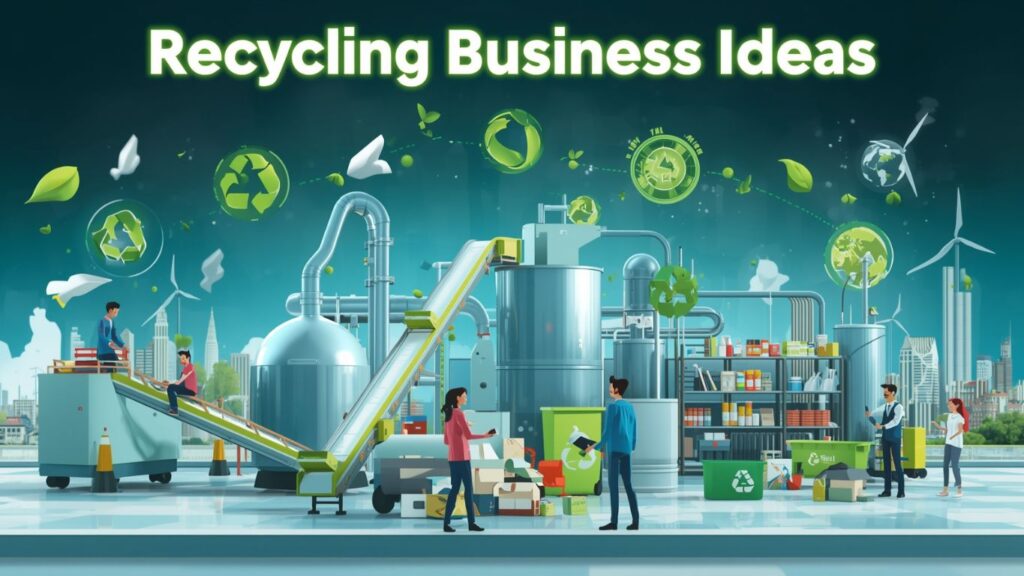Look around your city or town. You will find full garbage containers and great heaps of rubbish. This garbage colossus is an Indian issue. Our towns are becoming congested and we consume more than ever. That causes too much waste which contaminates soil, water, and air. However, perhaps that rubbish is not trash. Maybe it’s a hidden treasure.
Recycling converts garbage into value. It refers to the process of gathering and reprocessing waste products into new products. The annual waste generated by India is 62 million tonnes, with approximately 25–30% recycled. Plastic accounts for 3.5 million tonnes of waste annually, and e-waste is growing by 30% per year, making India the 3rd-largest producer of e-waste in the world. Government policies and growing awareness among people are expected to expand the waste-management industry to over ₹35,000 crore by 2030.
The recycling business in India has evolved from small informal setups to large, technology-driven enterprises capable of generating substantial profits while addressing critical environmental challenges. By 2025, the global recycling market is projected to reach $263 billion, with waste recycling growing at 5.3% CAGR, plastic recycling expanding rapidly, battery recycling projected from $12.8B to $19.8B by 2030, and metal recycling estimated at $629B with 6.1% CAGR.
Recycling business ideas are increasingly needed in India on a daily basis. Waste management is essential to make India clean and healthy. This necessity gives a lucrative opportunity to individuals who want to build a business that earns money while benefiting the planet. Being a successful business owner and a green hero, starting a recycling business is a great idea.
Growing Needs of Sustainable Practices and Recycling in India
To initiate recycling business ideas in India is a brilliant idea at this point of time. It is not just about cleaning up it is a fast-growing business with a glowing future. The reason is to consider this:
1. A Huge and Growing Market:
India produces a lot of waste on a daily basis. The amount of waste annually generated is approximately 62 million tonnes. It is a sad fact that we do not collect 100 percent of it, and less than 25-30% is collected and recycled. This large gap between garbage produced and garbage recycling is an opportunity for a business.
The market of waste-management in India is developing rapidly. Experts indicate that it will continue to expand even further in the forthcoming years, which will provide more space to new businesses such as yours.
2. Strong Government Support:
The Indian government is aware of waste management. It has initiated numerous plans and regulations to encourage recycling. One such famous instance is the Swachh Bharat Mission (Clean India Mission). Other rules introduced by the government include the E-Waste management rules and the Plastic waste management rules.
Such regulations promote increased recycling and the business environment is favorable. The government also provides assistance and even funding on green businesses.
3. It is the large demand of the products that are recycled:
Most companies are now desiring recycled materials to use in their products. It will save them money and will make them appear green. Recycled plastic, recycled paper, metals and compost are always needed. Through the recycling business, which you start, you will supply these raw materials to other businesses.
4. You Can Make Good Profits:
Recycle business is a lucrative one. You pick up the stuff that people discard and give out to you at cheap rates, and make it a great product. Good profits can be achieved through proper planning and hard work. You will give jobs to thousands of people, waste pickers and factory workers. It is a company that aids in the development of society.
8 Best Recycling Business Ideas in India
These are the most excellent recycling business plans you can launch in India in 2025.
1. Plastic Recycling

Plastic is ubiquitous in the form of bottles, bags, toys and packaging. The majority of it finds its way into landfills and in oceans and is harmful. It is a profitable business that needs a plastic recycling firm. The primary task will be picking plastic waste including PET bottles (water and soda bottles) and HDPE containers (milk jugs, shampoo bottles). It is one of the best recycling business ideas.
You sort the plastic by type and color after picking it. Clean it well then to get the dirt and labels off. The clean plastic is broken up and cut into minute flakes. These flakes are melted and shaped to small balls or grains. The end product is the plastic pellets. You are able to sell them to factories producing new products such as chairs, buckets, pipes and even T-shirts.
Target Market / Audience:
The customers are the companies that are producing plastic products like furniture, packaging products, pipes, polyester fabric and other plastic products. They will buy the recycled plastic pellets off you.
Startup Requirements:
A small plant needs a sizable space. The key devices include a plastic shredder, a washing unit, a dryer and a pellet machine (extruder). You must also have SPCB and GST registration as well as permits with the State Pollution Control Board (SPCB).
Profit Potential / Margin:
Plastic recycling has the capability of providing good profit. This would give you a profit of approximately 20% to 35%, and this depends on the level of efficiency and the recycles that you use.
Challenges / Risks:
The primary obstacle is the search for a consistent source of clean sorted plastic waste. The scrap plastic price might vary considerably. You should also be able to dispose of the cleaning wastewater appropriately.
Success Pointers:
Develop a stable network of waste pickers or collaborate with the local government to get a constant flow of plastic. Better returns should be on high value plastic like PET and HDPE.
Also Read: Best Business Ideas in India
2. E-Waste (Electronic Waste) Recycling
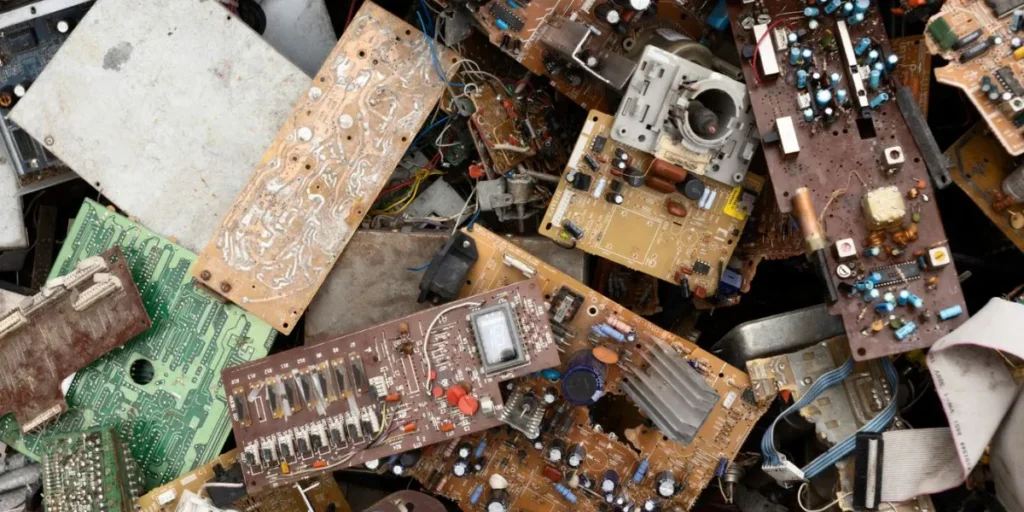
Laptops, old phones, and television become e-wastes. E-waste is an issue that is rapidly increasing in India and it is hazardous since it harbors toxic elements like lead and mercury. It is also endowed with precious metals such as gold and silver, and copper. It is one of the best recycling business ideas.
These old electronics are picked by an e-waste recycling business. It is done meticulously and includes disassembly of the items by hand, de-batteries, de-plastic, de-board, and de-wires. Thereafter the precious metals are removed using special procedures. The hazardous wastes should be safely disposed of as required by the government. This is a business that is not easy yet yields very well.
Target Market / Audience:
The buyers are smelters and metal refineries which purchase the metals such as copper, copper, aluminum and precious metals. It is also possible to sell the plastic that has been separated to plastic recyclers.
Startup Requirements:
You require technical skills. Acquire a location and employ talented employees to take things to pieces. This requires the approval of the Central Pollution Control Board (CPCB) since e-waste is hazardous.
Profit Potential / Margin:
E-waste recycling will result in high profits due to metals within it. Big operations may have profit margins of 30% to 50% or higher.
Challenges / Risks:
Costs of set up may be high. The work with the dangerous materials is dangerous and requires high safety. It may be difficult to secure a regular stream of e-waste at home and in offices.
Success Factors:
Collaborate with the big companies, government agencies, and residential areas to conduct e-waste collections. Provide them with a certificate to show them that they are responsible in disposing of e-waste.
Also Read: Mobile Business Ideas
3. Paper Recycling
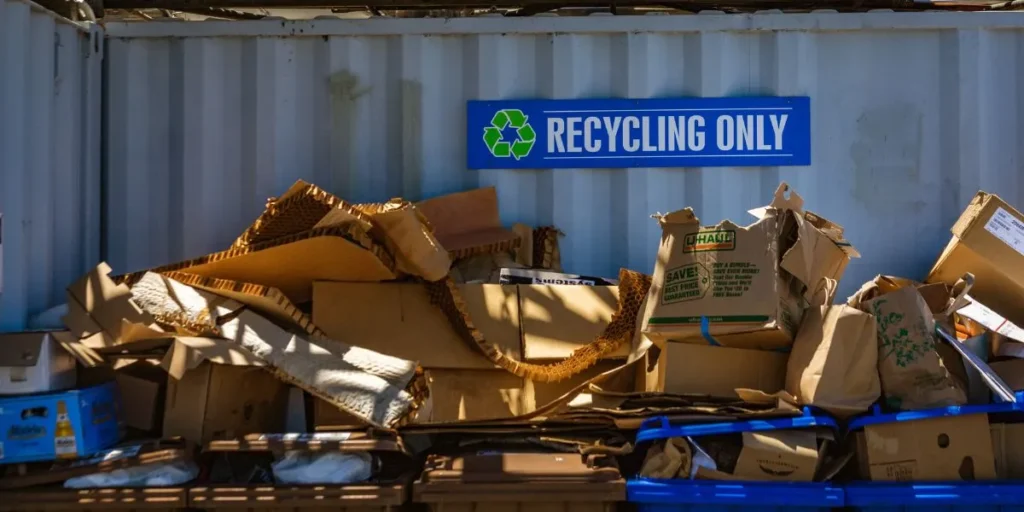
Imagine all the newspapers, all the notebooks, all the cardboard boxes and all the office papers that we use and discard. Trees are used to make paper and recycling paper helps in saving our forest. The paper recycling business gathers any type of waste paper. A large tank is then poured with water and chemicals that destroy this paper into a soupy fluid known as pulp. The pulp is washed with the ink, plastic bits and glue.
Cleaning is followed by placing the pulp on big flat screens to drain the water into which new sheets of paper are created. The sheets are then pressed, dried and rolled into huge rolls. It is one of the best recycling business ideas. Newspapers, cardboard boxes, tissue papers and egg cartons can also be made using this recycled paper. It is an established recycling company that is never out of demand.
Target Market / Audience:
The customers include paper mills, packaging firms, newspaper publishers and tissue paper/paper products manufacturers.
Startup Requirements:
You require a large space on the plant and warehouse. The major machines include a pulper, de-inking machines, screens, and a paper-making machine. There must be a sufficient supply of water.
Profit Potential / Margin:
Paper recycling is profitable with a typical profit margin of 15- 25%, based on the waste paper price, and the quality of your recycle.
Challenges / Risks:
The waste paper price may vary. It is a very water and electricity consuming process that may be costly. Wastewater should also be treated.
Success Factors:
To succeed, it is necessary to gather high-quality paper waste, including white office paper, which will fetch a better price. Established a collection network consisting of offices, schools, printing presses and scrap dealers.
4. Glass Recycling
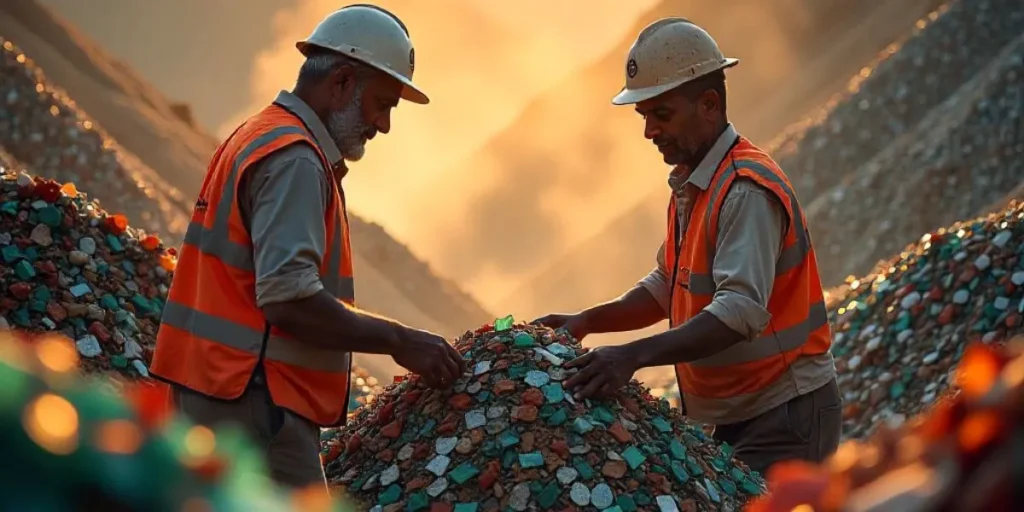
Glass bottles used in soft drinks, juices and jams are recyclable indefinitely and in the process, the quality is not lost. A recycling business on glass would minimize the necessity of producing new glass, which consumes a lot of energy. The operation of this business is the collection of used glass bottles and jars. The initial stage involves classifying the glass by color; clear, green and brown.
The reason behind sorting is that mixing of colors would influence the quality of the new glass. The glass is sorted after which it is washed to remove any food, liquid or paper labels. Then it is beaten into small pieces termed as cullet. This is the primary item that you sell. This cullet is melted in the glass furnace by manufacturers to form other glass bottles, jars and other glass products.
Target Market / Audience:
The main clients are glass manufacturing companies. They employ cullet as raw material because it melts at lower temperature than raw materials hence they save on energy and money.
Startup Requirements:
You shall require a collection yard, and a simple processing unit. A glass crusher will be the required main equipment. You also require human labour to sort the glass manually.
Profit Potential / Margin:
Glass recycling is a low profit margin business with an average of 10 to 20%. The profitability is conditional upon a smooth running of the collection and sorting process.
Challenges / Risks:
It may break as glass may be hard and risky to collect and transport. It is not always easy to find a stable source of waste glass. Cullet may have a small number of large buyers in the market.
Success Factors:
Collaborate with hotels, restaurants, bars, and wedding halls since they produce a huge amount of glass bottles. Keep your cullet well sorted by color in order to receive the best price.
5. Metal Recycling
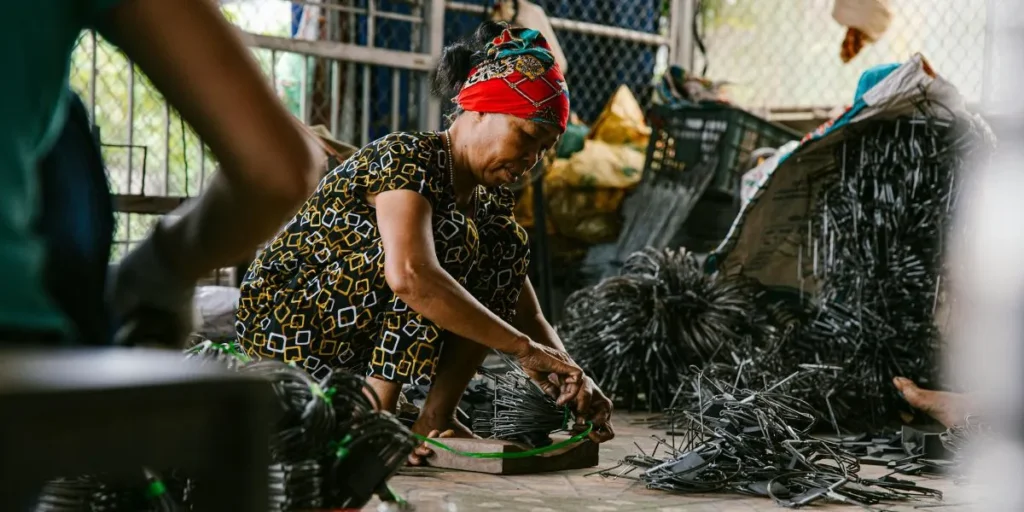
Metal is a highly useful substance to recycle. Consider car parts of old construction rods, aluminum cans, and copper wires. One of the recycling businesses, a scrap yard, is concerned with gathering and recycling this metal waste. Metals are of two classes: the ferrous (such as iron and steel) and non-ferrous (such as aluminum, copper, and brass). It is one of the best recycling business ideas.
The operations of the business include the collection of scrap metals in different locations such as construction sites, old vehicles and factories. The metals gathered are then separated with the help of powerful magnets to separate the iron and steel metals with other metals.
Target Market / Audience:
Target is primarily steel mills, foundries and furnaces that melt scrap metal to produce new steel bars, sheets and other metal products.
Startup Requirements:
This business needs a huge space where the scrap yard should be located. You will require heavy machinery such as baling presses, shears (to cut) as well as cranes with magnets. Investment can be high.
Profit Potential / Margin:
Recycling of metals is highly profitable. Margins can range from 25% to 40%. Non-ferrous materials such as copper and aluminum are sold at a very high price as compared to steel.
Challenges / Risks:
The cost of land and machinery is great. The prices of metals may fluctuate within a very short time on the world market and this impacts on your gains. The scrap yard is also a large one that is going to be administered, and the safety of the workers is also a considerable task.
Success Factors:
Build a good relationship with the local scrap collectors (kabadiwalas), auto garages and demolition contractors. Modern sorting technology will help you to sort out various metals in the most accurate way possible, so as to earn as much as possible.
6. Textile Recycling
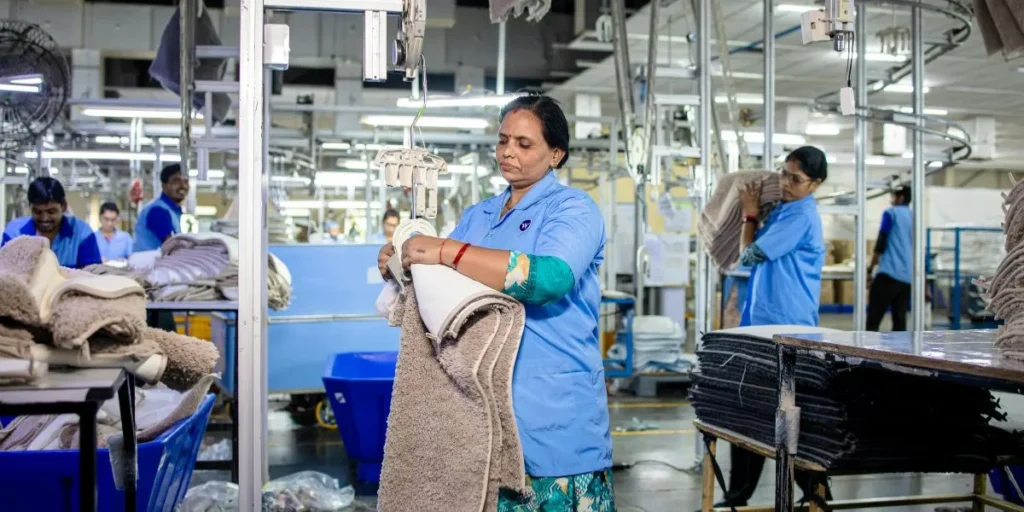
The fashion industry generates much waste. Our unworn garments and scrap of fabric used in manufacturing garments usually find their way to landfills. This waste is given a second life by a textile recycling business. It is a business, which gathers pre-consumer waste (factories) and post-consumer waste (old garments).
The gathered textiles are also separated according to the color and type of material (such as cotton, wool, polyester). Shredding is done after sorting to produce fibers. These fibers can then be washed clean and are re-spun into yarn in order to produce more clothes or fabrics. Non-woven products such as mattress stuffing, car insulation, industrial wiping cloth, and carpets can also be made using them.
Target Market / Audience:
Your customers may be spinning mills that require recycled fibers to create yarn, or they may be companies that produce products such as stuffing toys, carpets, soundproofing material.
Startup Requirements:
A warehouse to sort and process is required. The most significant equipment is the industrial shredders and fiber cleaning machine.
Profit Potential / Margin:
The profit margin may be approximately between 20 and 30%. The price will be relative to the quality and the nature of the cloth you are recycling.
Challenges / Risks:
Sorting of various fabrics can be extremely labor intensive and problematic. Gathering a big amount of textile waste would as well be a problem regularly.
Success Factors:
Find garment factories, export houses, and large laundries and collaborate with them to find a guarantee supply of fabric scraps. You can as well place collection bins in the residential areas where old clothes are to be collected.
7. Clothes & Textile Reuse

This is slightly different with the recycling of textiles. The business does not convert clothes into fibers but provides clothes a second opportunity to be bought again. It pays attention to re-using and up-cycling. You may want to initiate a business to collect used/slightly used clothes for people. Then you sort and wash and iron and mend them. Then, you resell them at a very cheap price on a thrift store, online or in a brick and mortar store.
There is also the concept of upcycling: take used clothes, such as a pair of jeans and transform them into a new and stylish item, such as a stylish bag, a patchwork jacket or cushion covers. This industry is more of an industry of creativity than of machinery. It is an excellent option for fashion-loving individuals who are ready to advance sustainable fashion.
Target Market / Audience:
Your clients are low-end shoppers and students and individuals who are fond of unique, vintage, or upcycled items of clothing.
Startup Requirements:
It can be launched on a very small scale even at home. You require storage space, a good washing machine and sewing. A good place to begin selling is an online store or a page on social media.
Profit Potential / Margin:
Profit margins are potentially very high, and in upcycling, your creativity adds a significant amount of value. In the case of thrift stores, it may be 50% and higher since the price of obtaining clothes is minimal.
Challenges / Risks:
It will be challenging to find good quality used clothes. The trends in fashion are very dynamic and thus you must be aware of the interests of the people to purchase.
Success Factors:
Position your brand as an eco-friendly and fashionable one. Post on social media, such as Instagram, with upcycled products and/or a thrifted collection. Give people who give out clothes little discounts and organize collection drives.
Also Read: Reselling Business Ideas
8. Organic Waste Composting
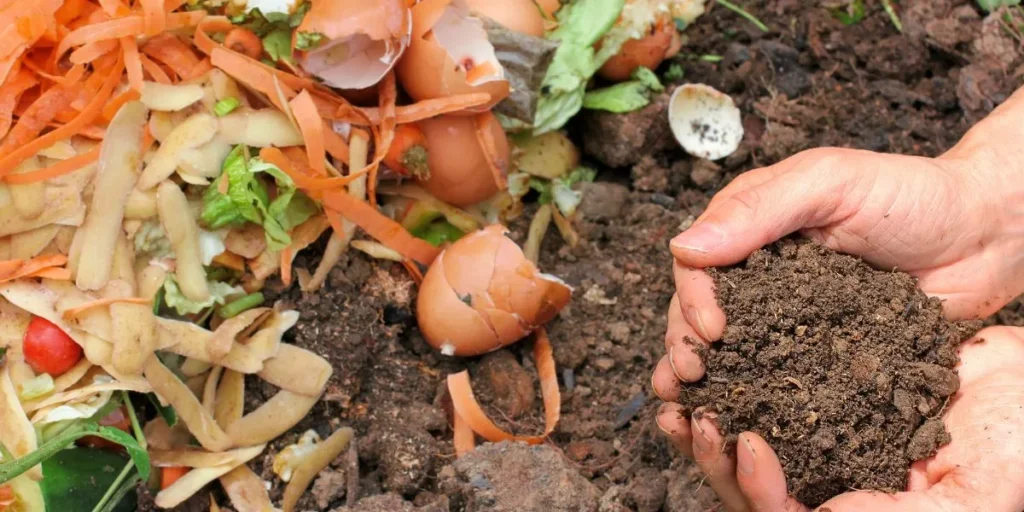
Much of the waste around our homes is organic and this includes vegetable peels, food leftovers and leaves and grass among other items that are in our gardens. As such waste may be disposed of in a landfill it decomposes and releases dangerous methane gases.
This kitchen and garden trash is converted into a black gold compost which is a nutrient-rich compost in the organic waste composting business. The process is simple. It is one of the best recycling business ideas. You gather organic waste and deposit it in big piles or bins. This compost is an excellent natural fertilizer that ensures the health of the soil, as well as growing plants in a better manner. It is a natural, easy process of recycling.
Target Market / Audience:
Your target audience will be farmers, plant nurseries, home gardeners, landscaping firms and anyone who desires to grow their plants without engaging in chemical fertilizers.
Startup Requirement:
You do not need a lot of land to start this business in your backyard, but you can start it on a large scale provided that you have land. You have to have a place to pile up the compost, a shredding machine to turn away the garden debris, you need a shovel, forks, etc.
Profit Potential / Margin:
Composting is a small-scale business with high returns. The profit margins are 40-60 per cent, particularly when you sell packaged and branded compost.
Challenges / Risks:
Sometimes, the composting process may bring a bad smell in case of improper management. It may be challenging to gather organic waste, which does not contain any plastic or other pollution. Also it requires a long time to convert the waste to compost.
Success Factors:
Build partnerships with hotels, restaurants, vegetable markets (mandis), and big apartment complexes with which to obtain a continuous supply of organic waste. Have your compost also lab tested and sell it as a certified organic fertilizer of high quality.
How to Start a Recycling Business in India
There are a couple of steps that are involved in starting a recycling business. It is a simple guide to assist you here:
Step 1: Select Your Niche and Make a Plan:
First, you need to decide on what you are going to recycle. Is it e-waste, paper, plastic or otherwise? See what folks do with that stuff and what they sell it at. Write a clear business plan. Ask them such questions as: Where are you going to find the waste? Who is going to purchase the completed product? What is the amount of money that you require to start?
Step 2: Plan Money (Capital):
A recycling business will require money to buy land, machines and miscellaneous work. Use personal savings, obtain bank loans or locate investors. The MUDRA loan for small businesses is one of the schemes that can be explored in India.
Step 3: Get the Legal Documentation:
Incorporate your company. You require a GST number, domestic trade license as well as Udyog Aadhaar. Obtain a “Consent to Establish” and Consent to Operate with your State Pollution Control Board (SPCB). In the case of e-waste as well, you will require particular authorization by the CPCB.
Step 4: Establish Your Plant/Facility:
Have a nice location. It ought to be in a manufacturing section and distant to dwellings. Ensure adequate storage of raw waste materials, running of machines and storing of the final product.
Step 5: Purchase the Right Machinery:
Select the equipment to suit your material. Plastic recycling may require a baler, a shredder, a washer, and a pelletizer. Purchase efficient and durable machines.
Step 6: Develop your Supply Chain:
You require a stable supply of waste. Make contacts with scrap dealers, waste-management firms, local governments, or apartment tenants, office workers, and factory employees. Develop a good system of collecting the garbage.
Step 7: Find Your Team:
You will also require employees to sort the waste, machines to get things moving and a supervisor to manage the plant. Train everyone on safety.
Step 8: Sell and Market Product:
Find a buyer of your recycled material. Discuss with those manufacturers that require it. Go through websites on the Internet, industry associations, or tour industrial zones. Enhance a good reputation by providing good quality material at all times.
Indian Recycling — Business Profit Margins.
The amount of profit that you can make will depend on the material that you will be recycling. Here is a rough guide:
- E- waste recycling: 30-50 (high profit due to valuable metals but expensive to start-up).
- Organic Waste Composting: 40% -60% (low start-up, great profit when sold out).
- Metal Recycling: 25% -40% (highly profitable, particularly non-ferrous metals, however, requires heavy investment).
- Plastic Recycling: 20% -35% (good demand and stable profits).
- Textile Recycling: 20 -30% (emerging market).
- Paper Recycling: 15-25% (stable business).
- Glass Recycling: 10%-20% (lower percentage but easy procedure).
These are estimates. The profit that you get will actually be determined by how you operate the business, the price of the raw material, where you are located and the cost management.
Advantages of Opening a Recycling Company.
There are a lot of positive results in the starting of a recycling business:
- You Help the Environment: You reduce pollution, conserve trees, water, minerals, and landfill wastes.
- You Earn a Good Living: It is an expanding profession with a stable need thus; you will be able to earn a good income.
- You Create Jobs: Your plant has collectors, workers and supervisors, which benefit the community.
- You Fuel the Indian Economy: You contribute to the Indian Economy by creating the raw material out of waste, contribute to the Make in India target and reduce reliance on imports.
Conclusion
India requires a serious intervention on the management of waste and that offers a tremendous opportunity to business persons. Recycling business is not just about money but about creating a better future; a cleaner, greener and more sustainable future. Plastic and e-waste, composting, and textiles are only some of the recycling business ideas that can bring a successful and profitable and responsible business.
Through proper planning, industriousness and governmental assistance, you can transform garbage into gold. Recycling is a good business concept to consider in 2025. You would be the green leader that India wants.
Also Read:
FAQs
1. Is recycling a lucrative Indian business?
Yes. Profit is based on material, your plan and the efficiency of operation. Recycling can be done to a large extent with e-waste and metal.
2. Which is the simplest recycling company to start?
The simplest ones are organic waste composting and clothes reuse/upcycling. Small scale and minimal equipment are required with them.
3. What is the capital required to start a company in recycling?
Costs vary. It requires a small amount of 50,000 to start a small composting business. A medium plastic or paper plant might require ₹20 50Lakhs. There is no doubt that a big metal or e-waste plant will cost crores of rupees.
4. What are the necessary government licenses in a recycling plant?
The primary license is the license of the State Pollution Control Board (SPCB). Register the business also, get GST and obtain a local trade license.
